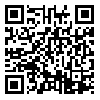Volume 11, Issue 1 (Spring 2025)
DSME 2025, 11(1): 1-12 |
Back to browse issues page
Ethics code: IR.BUMS.REC.1401.204
Download citation:
BibTeX | RIS | EndNote | Medlars | ProCite | Reference Manager | RefWorks
Send citation to:



BibTeX | RIS | EndNote | Medlars | ProCite | Reference Manager | RefWorks
Send citation to:
baghernezhad F, Mohsenizadeh M, dashtgard A. Explaining students' experiences of virtual education during the covid-19 epidemic. DSME 2025; 11 (1) :1-12
URL: http://dsme.hums.ac.ir/article-1-373-en.html
URL: http://dsme.hums.ac.ir/article-1-373-en.html
1. Department of Health Education and Promotion, School of Health, Social Determinants of Health Research Center. Birjand University of Medical Sciences, Birjand, Iran.
Abstract: (2206 Views)
Introduction: Proper virtual education needs to pay attention to the needs of the learners, create a platform and implement the necessary interventions to solve the challenges. Accessing the experiences of learners from virtual education can provide valuable information to managers to improve the quality of virtual education. This study was conducted with the aim of identifying the problems and advantages of virtual education from the students' point of view.
Methods: This qualitative study was conducted with content analysis method on 20 nursing and health students. People were included in the study with a simple and accessible sampling method. Due to the limitations, information was collected through the Whats App group. Analysis continued simultaneously with data collection until data saturation. Codes were classified based on semantic units.
Results: After merging the primary codes, the extracted themes include two main classes and 5 subclasses. The category of virtual education problems included three subcategories of student learning problems, professors' problems in virtual education, hardware and software problems of education, and the category of virtual education advantages included two subcategories of flexibility of education, learning and using technology.
Conclusion: The findings of the study showed that virtual education has problems and advantages. Considering the necessity of using virtual education in some conditions, it is necessary to identify the problems and advantages of this method of education from the students' point of view.
Methods: This qualitative study was conducted with content analysis method on 20 nursing and health students. People were included in the study with a simple and accessible sampling method. Due to the limitations, information was collected through the Whats App group. Analysis continued simultaneously with data collection until data saturation. Codes were classified based on semantic units.
Results: After merging the primary codes, the extracted themes include two main classes and 5 subclasses. The category of virtual education problems included three subcategories of student learning problems, professors' problems in virtual education, hardware and software problems of education, and the category of virtual education advantages included two subcategories of flexibility of education, learning and using technology.
Conclusion: The findings of the study showed that virtual education has problems and advantages. Considering the necessity of using virtual education in some conditions, it is necessary to identify the problems and advantages of this method of education from the students' point of view.
Type of Study: Orginal |
Subject:
Special
Received: 2023/02/10 | Accepted: 2023/06/15 | Published: 2024/06/19
Received: 2023/02/10 | Accepted: 2023/06/15 | Published: 2024/06/19
Send email to the article author
| Rights and permissions | |
 |
This work is licensed under a Creative Commons Attribution-NonCommercial 4.0 International License. |








